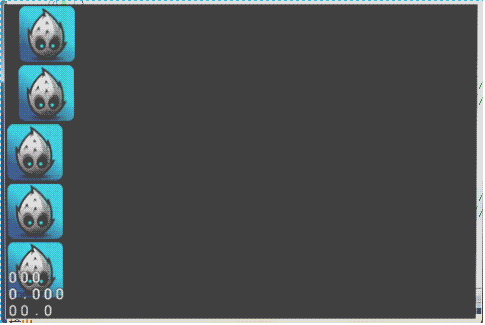cocos2dx基础篇(8)――定时器更新schedule/update
【唠叨】
定时器在大部分游戏中是不可或缺的,即每隔一段时间,就要执行相应的刷新体函数,以更新游戏的画面、时间、进度、敌人的指令等等。
cocos2dx为我们提供了定时器schedule相关的操作。其操作函数的定义在CCNode中,所以基本上大多数的引擎类都可以设置定时器,如CCLayer、CCSprite、CCMenu等。
定时器更新的方式分为三类:
(1)默认定时器 :scheduleUpdate();
(2)自定义定时器:schedule();
(3)一次性定时器:scheduleOnce();
【Demo下载】
https://github.com/shahdza/Cocos_LearningTest/tree/master/demo_%E5%AE%9A%E6%97%B6%E5%99%A8schedule%E3%80%81update
【3.x】
几乎无变化。
【scheduleUpdate】
默认定时器:scheduleUpdate()。
该定时器默认刷新次数与屏幕刷新频率有关。如频率为60帧每秒,那么scheduleUpdate每秒执行60次刷新。
与scheduleUpdate其对应的刷新函数体为update(),即每一帧会执行一次update()函数。
相关操作如下:
// //开启默认定时器。刷新间隔为一帧。 void scheduleUpdate(); void scheduleUpdateWithPriority(int priority); //给予优先级priority。priority越小,优先级越高 virtual void update(float delta); //update为scheduleUpdate定时器的刷新函数体. //
【schedule】
自定义定时器:schedule()。
该定时器可以自定义指定的刷新函数体、刷新函数体的次数、刷新频率、以及开始刷新的时间。
函数体不一定为update(),可以自己定义。
相关操作如下:
// //设置自定义定时器。默认刷新间隔为一帧。 // interval : 每隔interval秒,执行一次。 // repeat : 重复次数。 // delay : 延迟时间,即创建定时器delay秒后开始执行刷新。 //schedule( schedule_selector(HelloWorld::myUpdate), 1.0/60.0 ); void schedule(SEL_SCHEDULE selector); //默认刷新间隔为一帧 void schedule(SEL_SCHEDULE selector, float interval); //自定义刷新间隔,单位:秒 void schedule(SEL_SCHEDULE selector, float interval, unsigned int repeat, float delay); //
【scheduleOnce】
一次性定时器:scheduleOnce()。
该定时器在等待delay秒延迟时间后,只执行一次刷新函数体,之后就不再刷新。
相关操作如下:
// //只执行一次,delay秒后执行 //scheduleOnce( schedule_selector(HelloWorld::myUpdate), 5.0 ); void scheduleOnce(SEL_SCHEDULE selector, float delay); //
【其他操作】
定时器的取消、暂停、恢复。
相关操作如下:
// //this->unscheduleUpdate(); //sprite->unscheduleAllSelectors(); void unscheduleUpdate(void); //取消默认定时器 void unschedule(SEL_SCHEDULE selector); //取消自定义函数的定时器 void unscheduleAllSelectors(void); //取消所有定时器 void pauseSchedulerAndActions(void); //暂停所有定时器和动作 void resumeSchedulerAndActions(void); //恢复所有定时器和动作 //
【代码实战】
1、在HelloWorld::init()中创建五个精灵
精灵和五种定义定时器的方法,一一对应。
//
//创建五个精灵
CCSprite* sp = CCSprite::create("Icon.png");
sp->setPosition( ccp(30, mysize.height - 30) );
this->addChild(sp, 0, 100); //tag标记100
CCSprite* sp1 = CCSprite::create("Icon.png");
sp1->setPosition( ccp(30, mysize.height - 90) );
this->addChild(sp1, 0, 101); //tag标记101
CCSprite* sp2 = CCSprite::create("Icon.png");
sp2->setPosition( ccp(30, mysize.height - 150) );
this->addChild(sp2, 0, 102); //tag标记102
CCSprite* sp3 = CCSprite::create("Icon.png");
sp3->setPosition( ccp(30, mysize.height - 210) );
this->addChild(sp3, 0, 103); //tag标记103
CCSprite* sp4 = CCSprite::create("Icon.png");
sp4->setPosition( ccp(30, mysize.height - 270) );
this->addChild(sp4, 0, 104); //tag标记104
//定义五个定时器,更新精灵
this->scheduleUpdate();
this->schedule( schedule_selector(HelloWorld::myupdate) );
this->schedule( schedule_selector(HelloWorld::myupdate2), 1.0f );
this->schedule( schedule_selector(HelloWorld::myupdate3), 1.0f, 5, 3.0f);
this->scheduleOnce( schedule_selector(HelloWorld::myupdate4), 5.0f );
//
2、编写定时器对应的刷新函数体
//
//scheduleUpdate
void HelloWorld::update(float dt)
{
CCSprite* sp = (CCSprite*)this->getChildByTag(100); //获取 tag=100 的精灵
sp->setPosition( sp->getPosition() + ccp(1,0) ); //每帧移动1
}
//schedule(schedule_selector)
void HelloWorld::myupdate(float dt)
{
CCSprite* sp1 = (CCSprite*)this->getChildByTag(101); //获取 tag=101 的精灵
sp1->setPosition( sp1->getPosition() + ccp(1,0) ); //每帧移动1
}
//schedule(schedule_selector, interval)
void HelloWorld::myupdate2(float dt)
{
CCSprite* sp2 = (CCSprite*)this->getChildByTag(102); //获取 tag=102 的精灵
sp2->setPosition( sp2->getPosition() + ccp(60,0) ); //每秒移动60
}
//schedule(schedule_selector, interval, repeat, delay)
void HelloWorld::myupdate3(float dt)
{
CCSprite* sp3 = (CCSprite*)this->getChildByTag(103); //获取 tag=103 的精灵
sp3->setPosition( sp3->getPosition() + ccp(60,0) ); //每秒移动60
}
//scheduleOnce
void HelloWorld::myupdate4(float dt)
{
CCSprite* sp4 = (CCSprite*)this->getChildByTag(104); //获取 tag=104 的精灵
sp4->setPosition( sp4->getPosition() + ccp(100,0) ); //移动100
}
//
3、运行结果

4、分析与总结
(1)scheduleUpdate()和schedule(schedule_selector)的效果一样,只是schedule可以自定义刷新函数体,不一定是update()。而scheduleUpdate()的刷新函数体只能为update()。
(2)schedule(schedule_selector, interval):设置了interval=1.0,所以每隔1.0秒执行了一次myupdate2()。
(3)schedule(schedule_selector, interval, repeat, delay):在开始3.0f秒后才开始执行myupdate3(),并且之后又重复执行了5次,就停止更新了。
(4)scheduleOnce(schedule_selector):在开始5秒后,只执行了一次myupdate4(),就停止更新了。